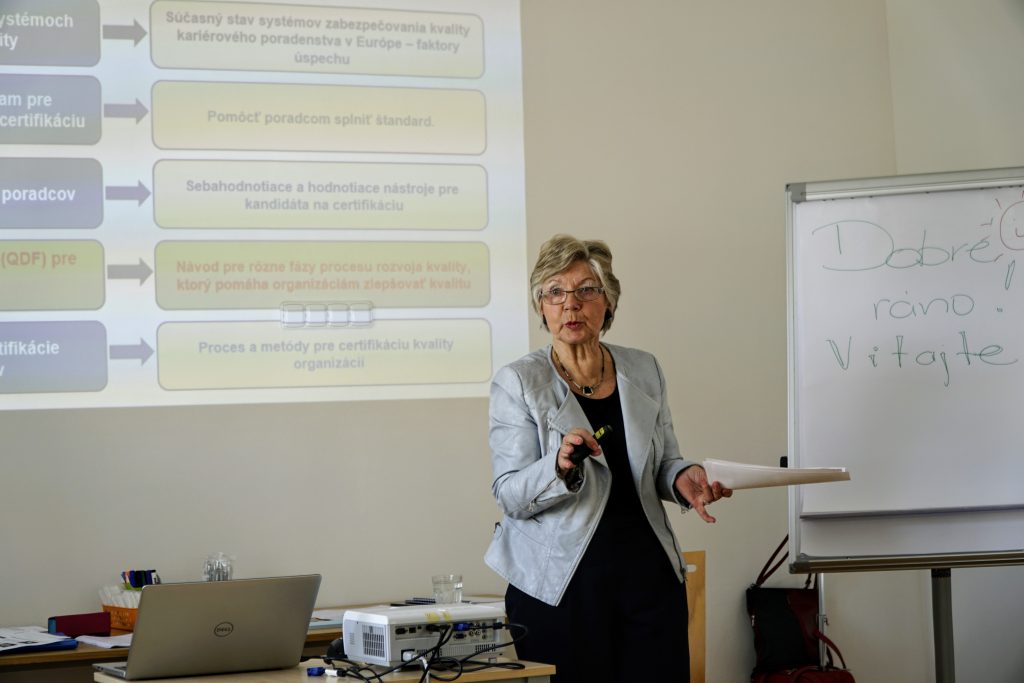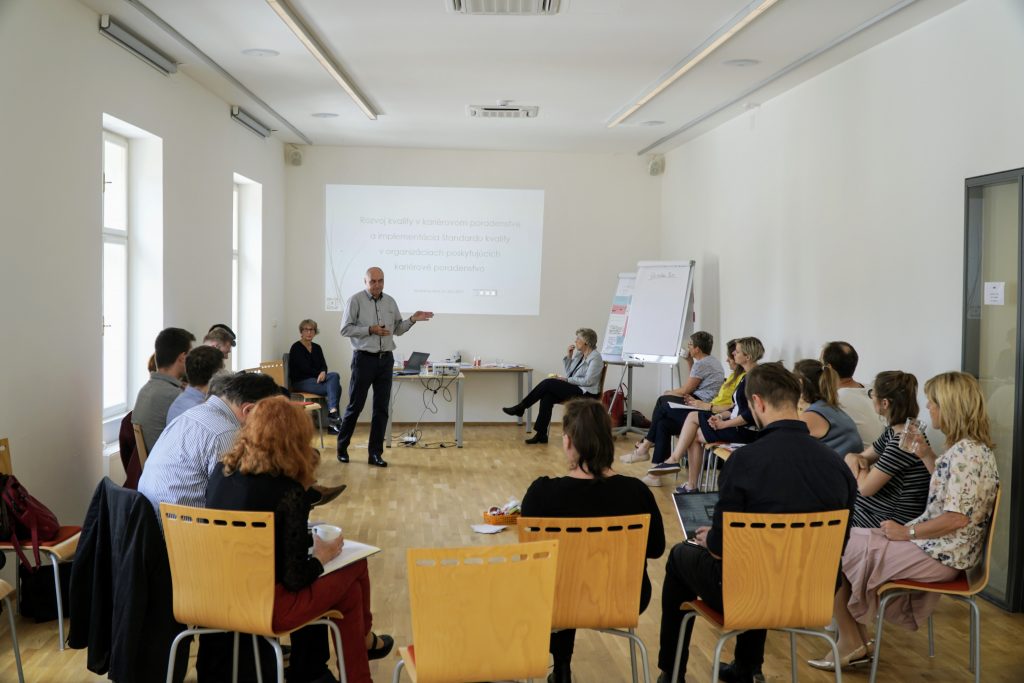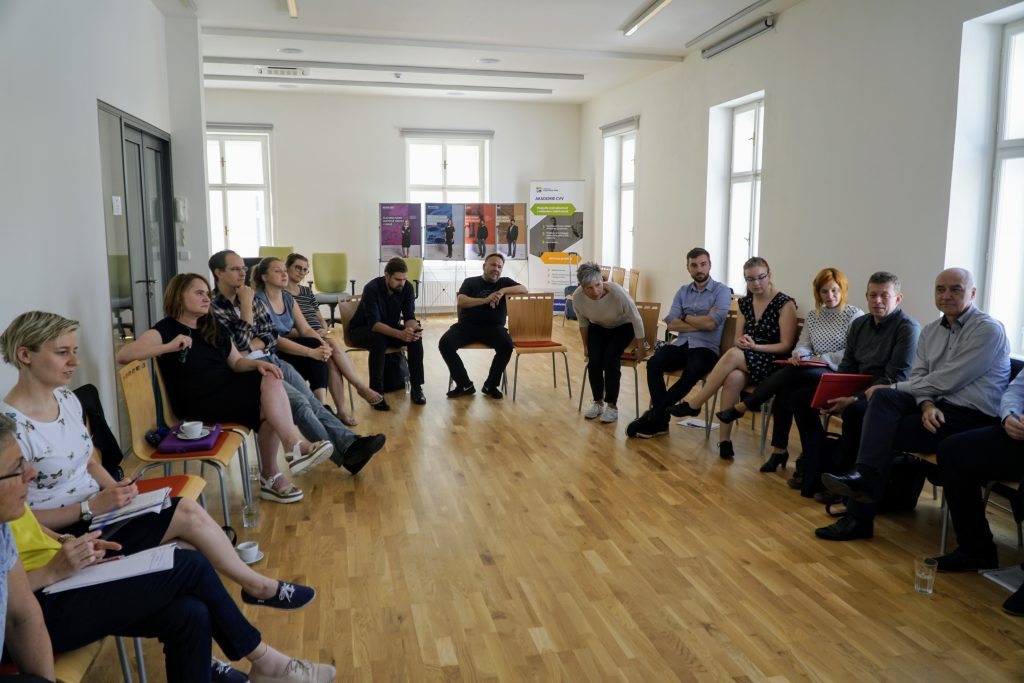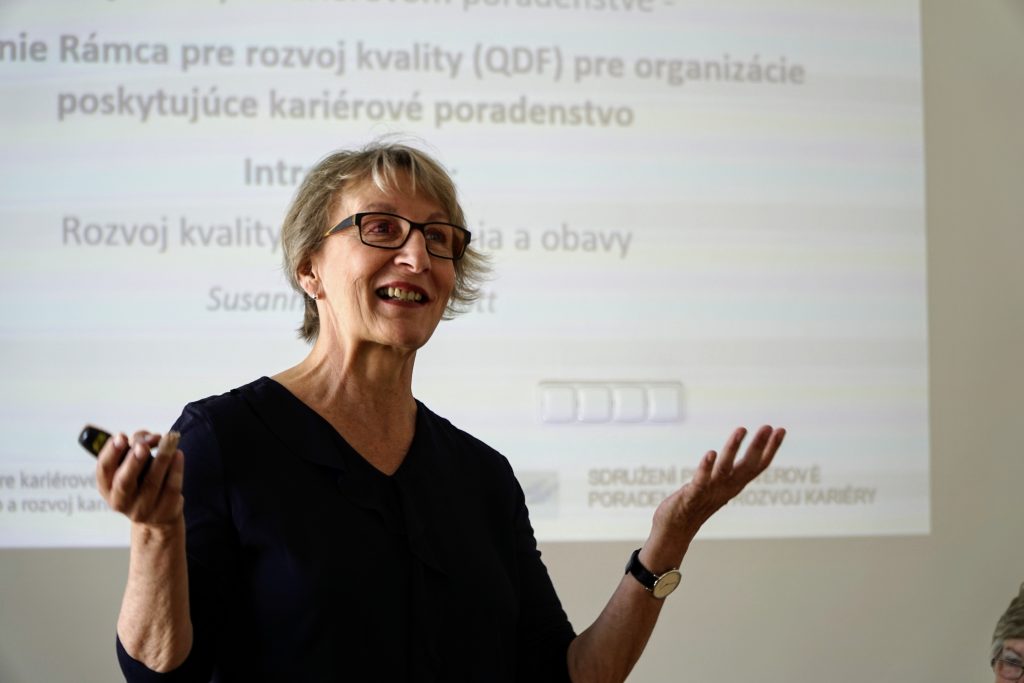The German National Guidance Forum (nfb) who has the lead for the Intellectual Output IO4 had agreed with the Czech and Slovakian partner organizations during the project meeting in s’Hertogenbosch to organize a joint workshop with guidance practitioners, providers, and responsible staff from public authorities to test the QDF model that was developed in Germany (BeQu-Concept) and to discuss its usefulness and transferability in career guidance systems in other European countries with different social and political contexts.
The workshop was jointly organized by the Czech and Slovakian partner organizations
- SKPRK, CZE (Andrea Csirke)
- BKS Úspech, s.r.o. (Pavol Kmet)
- ZKPRK, SK (Tomas Sprlak)
and took place in the “Centre Education for All” in Brno.
The preparation of the programme and the implementation were in the responsibility of the trainers from the German National Guidance Forum (nfb), Susanne Schmidtpott and Karen Schober. The workshop was held in English language with some simultaneous translation facilities if necessary. The PowerPoint presentations and the workshop materials were available both in English and in Czech/Slovakian language which was quite helpful for mutual understanding and discussion. An introduction to the aims and objectives of the workshop, a preliminary programme and some excerpts of the QDF-Manual as well as the Czech/Slovakian Quality Standards for career guidance provider organizations were sent to the participants 1 – 2 weeks ahead of time.
The workshop was carried out with 22 participants from different backgrounds like for instance from a school authority, from labour offices, from an NGO, from professional career guidance associations, from self-employed career professionals, from Institutes offering “bilan de competence” etc. Following organizations participated on the workshop:
- Labour office, Zlín, Czech republic (PES)
- Labour office, Kroměříž, Czech republic (PES)
- Labour office, Rožňava, Slovakia (PES)
- Labour office, Banská Štiavnica, Slovakia (PES)
- National Institute for Education, Czech republic (policymaking and funding body)
- Centre “Education for all”, Brno, Czech republic (non-profit guidance provider)
- Association for career guidance and career development (Czech and Slovak associations)
- Municipality of Brno (policymaking and funding body)
- Centre “Kariéra Info”, Pilsen, Czech republic (non-profit guidance provider)
- Teamwork for better future, Veľký Meder, Slovakia (non-profit guidance provider)
- A.B.A., Slovakia (non-profit guidance provider)
- AGAPO, Czech republic (non-profit guidance provider)
- NOVA Training, Czech republic (commercial guidance provider)
- BKS Uspech, Slovakia (commercial guidance provider)
The workshop had two main goals:
- Presenting the German BeQu-Concept and its Quality Development Framework (QDF) as a tool for systematic and continuous quality development in career guidance provider organizations and making participants familiar with the different phases of quality development through practical exercises in group work during the workshop.
- Testing the transferability and application of the QDF in a wider European context and under the condition of different quality standards and quality assurance systems as a tool to prepare the organization for an external certification or auditing process. For this reason, we worked in phase 2 and 3 with the Czech/Slovakian Quality Standards.
Feedback from participants
The majority of participants thought that the QDF is a useful and reliable tool for continuous quality development because it systemizes the different steps and tasks to be carried out and provides a “backbone” for the process. Several participants articulated that they had already worked that way but on an intuitive basis and they find it helpful to rely on a recognized and acknowledged tool.
Some participants expressed their concern that they felt that their own organization is not yet ready for the implementation of such a quality development process. Nevertheless, they thought that the QDF is applicable for them individually. Others, especially employees of large organizations (e.g. labour offices, PES) felt that in their organization obstacles against such a participative and non-directive process were too high.
People from very small providers or self-employed career professionals said that they just lack time and resources to set up a QDF-process. Several participants admitted that they have learned that quality development needs time and cannot be implemented in a few weeks or months. This applies in particular to phases 1 and 2 of the QDF in order to really get involved all staff members, the management and also external partners and stakeholders. In general, it seems that there was a lot of information which made it sometimes hard to concentrate and keep track of what was going on.
Quantitative feedback also confirms a very positive reception of the QDF by the participants:
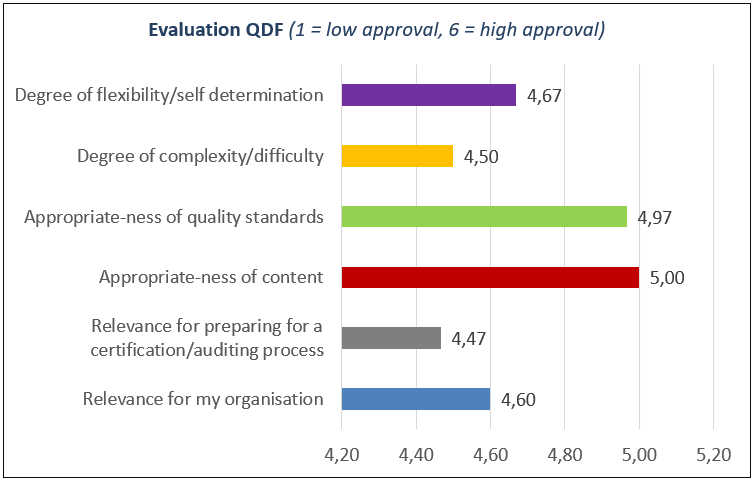
Summarizing the quantitative and qualitative results and feedbacks from the participants the workshop and the testing of the QDF turned out to be successful and of great value for most of the participants. From our point of view as trainers there was a very high level of involvement and engagement from the participants in the topic as such and also in the group work and discussions. and the plenary discussions.
Thinking of the QDF as a transversal tool which can be used by career guidance provider organizations to improve the quality of their service the feedback from the workshop indicates that the QDF can very well support such processes if the management of the organization are ready to engage in such a participative and non-directive process. This however depends largely on the type and size of the organization.
Regarding the usefulness for preparing for an external certification or auditing process the feedback was not so unanimous because in a certification process the organization has to follow prescribed procedures and react to prescribed quality criteria which does not leave it to the judgement of the staff members to identify the areas where improvement is needed most urgently. Nevertheless, the well-structured processes and procedures of the QDF were appreciated by all participants in the workshop.


